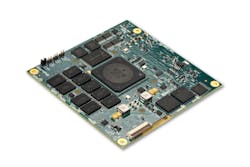Rugged COM Express Compact mezzanine board for military embedded systems introduced by X-ES
MIDDLETON, Wis., 15 March 2012. Extreme Engineering Solutions Inc. (X-ES) in Middleton, Wis., is introducing the XPedite5550 ruggedized COM Express module for harsh-environment military, aerospace, and industrial applications such as unmanned aerial vehicles (UAVs) and unmanned ground vehicles (UGVs). The embedded computing module targets Freescale QorIQ P1011, P1020, P2010, and P2020 processors with clock speeds as fast as 1.2 GHz.
The XPedite5550 COM Express module for military embedded systems measures 95 by 95 millimeters to comply with the PICMG COM Express Compact form factor and supports an enhanced Type-5 pinout, X-ES officials say.
The module can fit on a standard COM Express carrier card or on a custom carrier card, or integrated into the X-ES XPand6000 series of small-form-factor (SFF) rugged systems.
The module operates in temperatures from -40 to 85 degrees Celsius; has mounting holes for increased structural integrity; extended shock and vibration capabilities; supports conduction- and air-cooled applications in one design; has soldered down memory; uses a tin-lead manufacturing process to mitigate tin-whisker effects, with a RoHS-compliant process also available; and built-in test support.
The module has as much as eight gigabytes of DDR3-800, x2 and x1 PCI Express interfaces, three Gigabit Ethernet ports, two SATA 3.0 ports, two serial ports, and a USB 2.0 port. Software support includes Linux, Green Hills Integrity, and Wind River VxWorks. QNX, LynxOS, and other O/S support may be available as needed.
For more information contact X-ES online at www.xes-inc.com.

